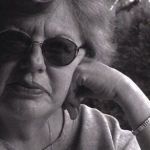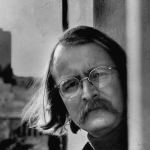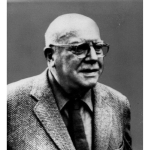Light from the ugliest lamp I ever saw, here
on the table that triples for reading, eating (can’t say
dining), business on the phone; ugliest except
a few around the corner in that guest house at windows
—plaster driftwood; cylinders like rockets or sanitary
napkins propping shades; thin torso of a youth;
red globe on orange globe, the works, somebody’s
collection. Wouldn’t she love this one, lump of lamp base
intending landscape, two donkeys in mustard glaze,
heads ruefully down, one carrying two rush panniers
large enough to hold your pens or salts and peppers; on
the other a shifty man with droopy moustache rides,
**
grumping under his sombrero; right leg broken
off at the knee, left leg clipped at ankle. They make
no progress, this mold-made work—the joins, arthritic
ridges where dabs of grayish green suggest
a wizened bush from which a brass post rises
to hold a shade that doesn’t fit and twice
has tried to burn, as crusty sores at the rim show.
These indecorous furnishings stand for failure, are
a clutter that weighs down, defeats the purpose,
like dumbbells taken along on vacations; the pen jar;
lamp base, sextant, portable folding triptych.
**
The writing table fills with clutter. Specials
coax me to nudge buying into play. A checkout
coupon lets me get some brand of lunch meats
fifty-five cents off if I spend two dollars
but I just can’t find it when I’m shopping, the ticket—
with its rubric of good news and inscrutable forest
of bar code, black on red—to lead me on; back home
there it is, on the table, laying waste my power to spend.
What I have wanted (with Larkin) to do must be
“essentially undoable, it belongs to the imagination.”
Rather, the demolition has begun, piss and shit
and blood mix in the snow-white bowl; and yet
**
I find the Beech Forest (behind the beach
dunes) that Allen recommended “without
reservation.” The man was right—it more
than satisfies, these beech ponds and their dune
forest. I sat on a pitch pine that had blown
over and then turned round and risen again,
and bowed part making a seat something like
a saddle; the tree was growing while I sat on it
as were the other pitch pines round the pond ruddy
in afternoon, late light of day, rough trunks
with tufts of twisted branches green with needles,
it was idyllic, wind speaking through the pines,
**
solitude:—O, yes, two high-breasted girls
came striding by, I heard them coming, I
heard them going, yammering at full volume
not looking left or right, they passed me, were
out of sight and soon of earshot, Doppler effect
caused by exuberant youth in oblivious chitchat.
And people are smoking in these dry woods too,
not policing their butts is how I know,
the butts will surface from the heavier, sifting sand,
sand spilling, surfing down hills, crashing in waves
over the path here. But call it solitude,
when a thought—but wait! I thought—I should not be
**
having a thought here, this moment: yet a vision
of a Chinese poet in his study overlooking
such a pond as this arrives out of the silence
like the yellow water lilies on the water, pads
spreading out in files like a design on the broadloom
of a lobby. The sage is working on a poem, brushing it
on silk, inspired by a blend of Tao and
Confucius. Doubtless he would not forget
allusions to Sung poets, if he were not
a Sung poet himself, in which case he would have to
echo Han or T’ang; and he would be writing
of solitude; time passing; absent friends
**
(enlightenment would have to be inferred).
No matter, I didn’t bring a pen today.
However, over there are inkberry bushes, so
with a reed I just might make a start. . . . Farther
on the path I listen to a bird, a warbler perhaps,
I do not know the song or see the bird.
There with the pines and sand and birdsong, and no
prayer- or guide- or selfhelp-book, no
serious commune, the mind must yearn to be
led on; it wants a deity, an altar to approach;
an altar at least to take steps toward; occasion
to rise to—with nothing planned for the mind,
**
it’s like a person suddenly blind, not blind
for a long time and knowing the ropes, but just
now, rope-stung, blind—and groping, feeling around
for the way, any way, or, closer to home,
when the power goes at night just getting from
here to there even though you know the drill,
—you never find the batteries when you need them,
groping down cellar for the circuit breaker then
you flip it; nothing, it’s a bigger failure you are part of—
know the layout in general yet without ceremony
the mind leans forward, over an edge, hoping for,
needing a little ritual, like a guide rail to keep it
**
from falling, going down. Even then the mind
finds need of other news, keeps on desiring
alterity somewhere at hand. For example,
walking the streets of Provincetown, nothing to see
but lots to look at, all that fluff and buff,
the Michelin-man day-trippers aching along;
suddenly I want a prayer book, maybe not
Bottles and Stools or The Little Red Book but still . . .
even a pocket copy of A Shropshire Lad,
such as I find soon after all the buff and fluff
at Tim’s, the only bookstore on the street,
handy for quick reads. Thin as a shortbread biscuit,
**
THE RICHARDS PRESS LONDON 1915, no doubt
with its khaki cover, intended for some Tommy’s
backpack, a backward solace for off-duty hours
in the trenches: admittedly not very much
on the other hand just the thing I’m talking after;
a talisman perhaps is all, an amulet
with words that say, buck up, come on, you’ll make it,
there’s something on after all this, no matter
what the words say. Housman’s “vision,” his drear
anguish of love for someone, something, lad
and landscape that never were, that might shoot threads
of gold among the bloody muslins and the mud;
**
mind wants other news than what the ruffled senses
bring data of—smoke or flesh or birdsong.
It saw there was a space within, reserved
for turning toward another; other; that
no bullet, arrowwood or beach plum might
fill, though these could occupy that space
a moment.
Again I heard the casual chirping
of that bird, off in that tupelo, the song
I did not know, below the cries of gull
and jay I did. The unknown I saw was not
enough to satisfy; or—satisfied when it
was framed, complement of what is known for sure.
**
It’s—like—when you go someplace strange, new,
the seashore, any boundary, you want to learn the names
of plants. Start looking at the edges of leaves. It gives
a grip on where you are, and who, or seems to,
to know bullbrier, bearberry, blueberry. You get a GUIDE
or a local to tell. On the dune path I found one, a gnarled
bush alone, hollylike but succulent leaf; nothing
like it in the book. But why feel helped in nature
by a name? When a horde of flower children wanted
to know what they should do to be saved (back when)
Snyder told them, “learn the names of plants;
of animals; learn to do something with your hands.”
**
Well I went out to that dune again: to cop a copy
of the leaf I took and lost: so it’s only bayberry
after all; dioecious, two-sexed: some leaves different
from others, that’s OK only one got pictured
in my book; but the waxiness, bayberry for sure, set
to be rendered into candles for a gifte shoppe,
nauseating noose of “scents.” Its nutlets twinkle
near the oily leaves aglow above the sand,
bone white. Doesn’t make me feel better to know now
about that scrawny straggler. Sanctimonious
pilgrim know-alls, Bradford & Co.! Forest
into desert, just like that. No time flat, considering.













Comment form: